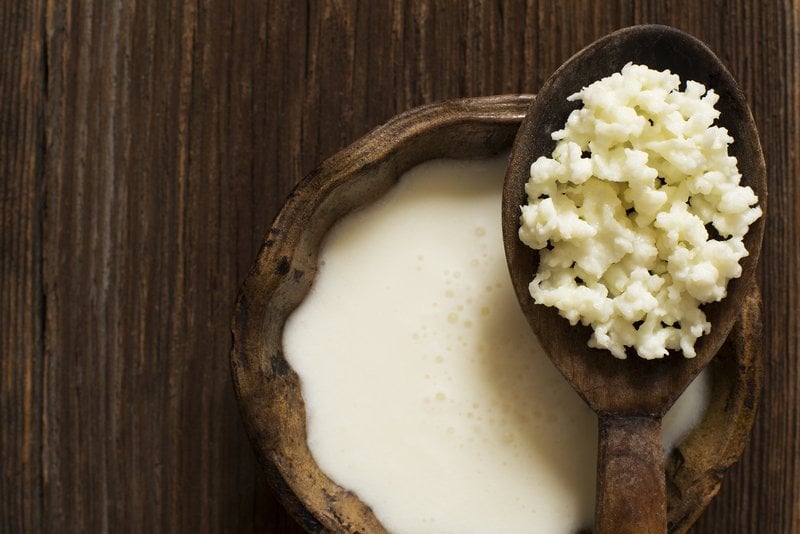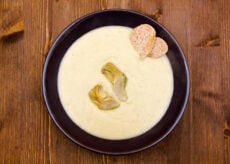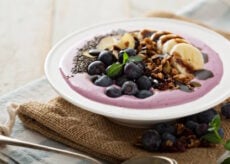The Best (and Worst) Foods for Gut Health

It’s no secret that what you eat has a direct influence on your body. The foods you fuel yourself with can have an effect on everything from your mood to your energy to your focus. And it all starts with your gut. The foods entering your body are the largest influencers and determinants of your gut microbiome. What are the worst foods for gut health to avoid? And what are the best foods for gut health that you want to make sure are part of your regular diet?
Why Are Gut Health Foods So Important?
The bacteria dwelling in your gut comprise your unique gut microbiome. The gut microbiome is a complex system responsible for aiding in digestion, immune function, and weight management. Maintaining a healthy gut can help ward off chronic diseases, fight inflammation, and support a healthy brain.
With so much of the body relying on a healthy gut, it is crucial that we nourish our bodies with the best foods to support good gut health. Unfortunately, not all foods are good for the gut. In fact, the worst foods for gut health can compromise and degrade gut functionality. These non-friendly gut foods can lower microbiota diversity, and they have been tied to various chronic conditions such as inflammatory bowel disease, diabetes, and obesity.
The Worst Foods for Gut Health
The first step is to know what the worst foods for gut health are, so you can limit these foods as much as possible. These include:
1. Processed Foods
Processed foods contain ingredients, such as emulsifiers and refined sugars, which can impair the microbial life in our guts. Further, ultra-processed foods break down into compounds that bad bacteria in the gut love to feed off of. Consuming too many ultra-processed foods can cause the bad bacteria to grow and ultimately outnumber the beneficial bacteria. In turn, this can reduce the species diversity in your gut and lead to inflammation.
2. Artificial Sweeteners
Artificial sweeteners appear to change the population of intestinal bacteria. Specifically, artificial sweeteners have been shown to have a direct impact on bacteria which can play a part in metabolism. For example, research has shown that artificial sweeteners can enhance the populations of gut bacteria that are more efficient at pulling energy from our food and turning that energy into fat. 1
3. Excess Alcohol Consumption
Alcohol can also cause an imbalance of gut bacteria, with an overgrowth of potentially harmful bacteria and a reduction in beneficial bacteria. Alcohol and its metabolites promote intestinal inflammation and may cause the tight junctions in the intestine to become leaky, allowing toxins to enter the bloodstream. Over time, excess alcohol consumption can lead to gut complications.

Supporting Gut Health
Beyond these foods, lifestyle can have a huge impact on the health of your gut microbiome. Some factors that can lead to negative effects on the gut include too much stress, lack of sleep, and physical inactivity. If you think your gut has fallen victim to these lifestyle factors with less-than-optimal function, proper supplementation may help jumpstart your journey back to health.
When choosing a supplement, make sure you find one that works for you, especially when it comes to gut health. Gut Reg® is formulated to nutritionally support the health and integrity of the gut lining by providing a unique blend of gut-soothing ingredients. Even more, it may support and fortify the body’s own protective mechanisms of the gut lining without interfering with normal digestive processes.
Previous poor diet habits do not define our gut health though. The gut microbiota can change rapidly, and research has shown that within two to four days of healthy eating, your gut microbiome can begin to change. 2 With this good news in mind, it is never too late to get your gut back on track with these gut-friendly foods.
Best Foods for Gut Health
When it comes to supporting gut health, there are two main categories of food: probiotics and prebiotics. Together, these categories are the superstars when it comes to an optimal gut. Fortunately, there are plenty of foods that fall under these categories, giving us a variety of options. Let’s start with probiotics.
Probiotics have gone mainstream and deservingly so. Probiotics are live beneficial bacteria and yeasts which may positively influence your gut. The most common probiotics are Lactobacillus and Bifidobacterium, which can be found in fermented foods.
Not only are these foods gut-friendly, they can also be delicious. With a new focus shifting in the direction of consuming probiotics, there’s an abundance of options in markets and grocery stores to find probiotic foods to suit your taste, such as:
Best Probiotic-Rich Foods
1. Yogurt
Yogurt is made when milk is combined with good bacteria. With yogurt’s expanding favorability, nearly every flavor can be found on grocery store shelves. Even non-dairy yogurts are available for those with dietary restrictions. However, not all yogurts are created equal. When buying yogurt, it is important to ensure it contains live beneficial bacteria as some yogurts are heat-treated after fermentation, killing the live cultures. In addition, many yogurts are full of sugar, which can delete their positive effects. Choose plain yogurt and sweeten it yourself with fruit for an even better gut-health food combination.
2. Sauerkraut
Sauerkraut is made from cabbage and salt. During the fermentation process, microorganisms eat the sugar present in cabbage and produce carbon dioxide and acids. Sauerkraut is a well-liked topping on sandwiches or even as a side.
3. Kombucha
Kombucha is a popular tart, fizzy tea made by adding a SCOBY (symbiotic colony of bacteria and yeast) and sugar to green or black tea. It’s then fermented, and gases are produced, giving the kombucha natural carbonation.
Some are hesitant to try kombucha as they don’t know what to expect, but brewing kombucha has become the latest trend among brewers and can be found in a variety of flavors, so virtually everyone can find one they enjoy.
4. Kefir
Kefir is like drinkable yogurt. It’s made when kefir grains, which are colonies of yeast and lactic acid bacteria, ferment the sugars in milk, giving it a slightly thicker consistency and tart flavor.
5. Tempeh
Tempeh is similar to tofu, but unlike tofu, tempeh is fermented, so it contains probiotics. Tempeh is made with fermented soybeans and then pressed into a cake. It can then be grilled, sautéed, or baked. Tempeh is high in protein and is also packed with B vitamins, calcium, manganese, zinc, and copper.
6. Kimchi
Kimchi is a staple in Korean cuisine. This traditional side dish is made from salted and fermented vegetables like Napa cabbage and Korean radish with a wide selection of seasonings.
7. Miso
Miso is a fermented paste made from barley, rice, or soybeans. Miso is great added to sauces, dressings, and soup bases as it is known for its rich and savory umami flavor.
8. Pickles
Pickles are cucumbers that are fermented with a solution of salt and water. They are left to ferment using their own natural lactic acid bacteria. This process makes them sour. However, it is important to note that pickles made with vinegar do not contain live probiotics.
9. Cheese!
Now before you get too excited, although most types of cheese are fermented, it does not mean they all contain probiotics. So, it is important to look for live and active cultures on the food labels. Fortunately, the good bacteria can survive the aging process in some cheeses. Look at the labels on cottage cheese, cheddar, Gouda, and mozzarella for live cultures.
If you have trouble incorporating probiotic foods into your diet, or if you want an extra push in the right direction, you can also supplement with a probiotic. When choosing a probiotic, though, you want to make sure you are choosing the right one.
An advanced probiotic supplement, like Pro-X10, provides 10 billion CFU daily of 6 super strains of probiotics, which help ward off bad bacteria, rebalance the gut microbiome, enhance digestion, and support healthy immune system function.
Even if you have a healthy gut, supplementation with the right types of support can help keep your gut happy and ultra-strong. I am very conscious of my gut and maintaining good gut health through healthy eating, regular actively, plus daily supplementation and have found that prioritizing my gut makes me feel better, improves my mood, and keeps my energy levels up.
Best Prebiotic-Rich Foods
Along with ensuring you feed your gut with plenty of healthy probiotics, you also want to feed the healthy microbiome with prebiotics. Like probiotics, prebiotics are beneficial to the microorganisms in your gut. However, unlike their closely related cousin, they have not been lifted into the spotlight.
You see, prebiotics are types of dietary fiber that feed the friendly bacteria in your gut. This helps the gut bacteria produce nutrients for your colon cells and leads to a healthier digestive system. Although all prebiotics are a type of fiber, not all fibers are prebiotics. Still, prebiotics are found in many of our common, everyday foods, including:
1. Vegetables
Such as cruciferous vegetables like cabbage, kale, bok choy, broccoli, cauliflower, and arugula, and allium vegetables like onion, garlic, scallions, shallots, and leeks.
2. Legumes
Such as chickpeas, lentils, soybeans, kidney beans, etc.
3. Nuts & Seeds
Such as almonds, flaxseeds, and pistachios.
4. Grains
Such as barley, oats, and bran.
5. Fruits
Such as bananas (especially green bananas), watermelon, apples, etc.
Although both probiotics and prebiotics are key players for good gut health, there are other foods which can be valuable in maintaining a healthy gut. In general, eating a range of fresh, whole foods and staying hydrated will aid in keeping your gut healthy.
Similarly, consuming polyphenols, which naturally occur in some foods like cloves and other seasonings, cocoa powder, berries, plums, and cherries, beans, and nuts, contribute to the maintenance of gut health by modulating gut microbial balance. Polyphenols act by enhancing the growth of beneficial bacteria and inhibiting the growth of pathogens. 3
It’s often said that you must nourish to flourish, and that is especially true when it comes to your gut. A healthy gut can make a world of difference in your mood, health, and all-around well-being. Becoming conscious of how food affects your body is an important step in taking charge of your health. And, incorporating healthy gut foods is an easy and delicious gateway to good health.







